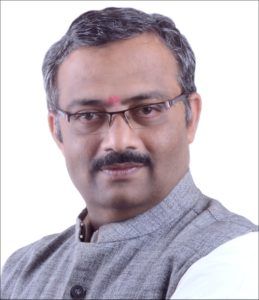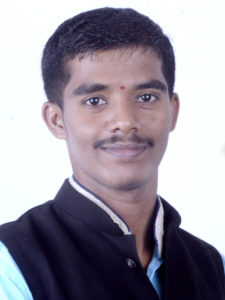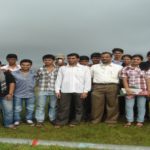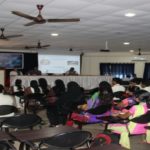About Department
Established upto F.Y.B.Sc. and S.Y B.Sc.level in 1997 T.Y. B.Sc. initiation: 2016-17
Mr. Sujit S. Pawar
Laboratory Assistant
H.S.C
Year of Joining 1996
Mr. Santosh T. Pawar
Laboratory Assistant
S.S.C
Year of Joining 1996
F.Y.B.Sc.
| Semester | Course | Course code | Weightage | Credit |
Syllabus |
|
I |
PHYSICS | USPH101 | 100 | 2 | View Syllabus |
| PHYSICS | USPH102 | 100 | 2 | ||
| PHYSICS | USPHP01 | 100 | 2 | ||
|
II |
PHYSICS | USPH201 | 100 | 2 | |
| PHYSICS | USPH202 | 100 | 2 | ||
| PHYSICS | USPHP02 | 100 | 2 |
S.Y.B.Sc.
| Semester | Course | Course code | Weightage | Credit |
Syllabus |
|
III |
PHYSICS | USPH301 | 100 | 2 | |
| PHYSICS | USPH302 | 100 | 2 | ||
| PHYSICS | USCP302 | 100 | 2 | ||
| PHYSICS Practical |
USPHP03 | 100 | 2 | ||
|
IV |
PHYSICS | USPH401 | 100 | 2 | |
| PHYSICS | USPH402 | 100 | 2 | ||
| PHYSICS | USPH402 | 100 | 2 | ||
| PHYSICS | USPHP4 | 100 | 2 |
T.Y.B.Sc.
| Semester | Course | Course code | Weightage | Credit | Syllabus |
|
V |
PHYSICS | USPH501 | 100 | 2.5 | T.Y.B.Sc.2017-18 Syllabus |
| PHYSICS | USPH502 | 100 | 2.5 | ||
| PHYSICS | USPHP05 | 100 | 3 | ||
| PHYSICS | USPH503 | 100 | 2.5 | ||
| PHYSICS | USPH504 | 100 | 2.5 | ||
| PHYSICS | USPH506 | 100 | 3 | ||
| PHYSICS | USACEI501 | 100 | 2 | ||
| PHYSICS | USACEI5P1 | 100 | 2 | ||
|
VI |
PHYSICS | USPH601 | 100 | 2 | T.Y.B.Sc.2017-18 Applied Component Syllabus
|
| PHYSICS | USPH602 | 100 | 2 | ||
| PHYSICS | USPHP603 | 100 | 2 | ||
| PHYSICS | USPH601 | 100 | 2 | ||
| PHYSICS | USPH602 | 100 | 2 | ||
| PHYSICS | USPHP604 | 100 | 3 | ||
| PHYSICS | USACEI601 | 100 | 2 | ||
| PHYSICS | USACEI6P1 | 100 | 2 |
Certificate Course: Sanctioned by UGC
Name of the Course : Semiconductor Devices & Technology
Syallabus: PDF – ADD-ON Course syllabus – Distribution
e-newsletter Publishing in Eureka
https://dubsscdapoli.in/wp-content/uploads/2024/04/Aditya-L1.docx
https://dubsscdapoli.in/wp-content/uploads/2024/04/Article-on-C-MET-Waykar-Rahul.docx
https://dubsscdapoli.in/wp-content/uploads/2024/04/article_on_chandrayan.docx
https://dubsscdapoli.in/wp-content/uploads/2024/04/BARC.docx
https://dubsscdapoli.in/wp-content/uploads/2024/04/DOS-and-ISRO.docx
https://dubsscdapoli.in/wp-content/uploads/2024/04/Gangayan.docx
https://dubsscdapoli.in/wp-content/uploads/2024/04/IISER-project.docx
https://dubsscdapoli.in/wp-content/uploads/2024/04/IITs.docx
https://dubsscdapoli.in/wp-content/uploads/2024/04/IUCAA-1.docx
https://dubsscdapoli.in/wp-content/uploads/2024/04/TIFR-Suhema.docx
Course Outcome (C.O.)
- CO1 – Develop analytical abilities towards real world problems
- CO2 – Familiarize with current and recent scientific and technological developments
- CO3 – Enrich knowledge through problem solving, hands on activities, study visits, projects etc.
- CO4 – Understand and practice the skills while doing physics practical.
- CO5 – Understand the use of apparatus and their use without fear.
- CO6 – Correlate their physics theory concepts through practical.
- CO7 – Understand the concepts of errors and their estimation.
Programme Outcome
Common to all Departments
Programme Specific Outcome
For F.Y.B.Sc.( I and II term)
I Sem
PSO 1. Understand Newton’s laws and apply them in calculations of the motion of simple systems.
PSO 2. Use the free body diagrams to analyze the forces on the object.
PSO 3. Understand the concepts of friction and the concepts of elasticity, fluid mechanics and be able to perform calculations using them.
PSO 4. Understand the concepts of lens system and interference.
PSO 5. Apply the laws of thermodynamics to formulate the relations necessary to analyze a thermodynamic process.
PSO 6. Demonstrate quantitative problem solving skills in all the topics covered
PSO 7. Understand nuclear properties and nuclear behavior.
PSO 8. Understand the type isotopes and their applications.
PSO 9. Demonstrate and understand the quantum mechanical concepts.
PSO10. Demonstrate quantitative problem solving skills in all the topics covered.
Practical
PSO1 To demonstrate their practical skills.
PSO2 To understand and practice the skills while doing physics practical.
PSO3 To understand the use of apparatus and their use without fear.
PSO4 To correlate their physics theory concepts through practical.
PSO5 Understand the concepts of errors and their estimation.
II Sem
PSO 1. Understand the basic mathematical concepts and applications of them in physical situations.
PSO 2. Demonstrate quantitative problem solving skills in all the topics covered.
Practical
PSO1 To understand and practice the skills while doing physics practical.
PSO 2To understand the use of apparatus and their use without fear.
PSO 3To correlate their physics theory concepts through practical.
PSO 4 Understand the concepts of errors and their estimation.
S.Y.B.Sc. ( III and IV Term)
IIIrd Term
Paper I
PSO 1) Understand the concepts of mechanics & properties of matter & to apply them to problems.
PSO 2) Comprehend the basic concepts of thermodynamics & its applications in physical situation.
PSO 3) Learn about situations in low temperature.
PSO 4) Demonstrate tentative problem solving skills in all above areas.
Paper II
PSO 1) Understand the basic concepts of mathematical physics and their applications in physical situations.
PSO 2) Understand the basic laws of electrodynamics and be able to perform calculations using them.
PSO 3) Understand the basics of transistor biasing, operational amplifiers, their applications
PSO 4) Understand the basic concepts of oscillators and be able to perform calculations using them.
PSO 5) Demonstrate quantitative problem solving skill in all the topics covered
Paper III
PSO 1) Students will be exposed to contextual real life situations.
PSO 2) Students will appreciate the role of Physics in ‘interdisciplinary areas related to materials, Bio Physics, Acoustics etc.
PSO 3) Understand the scope of the subject in Industry & Research.
PSO 4) Experimental learning opportunities will faster creative thinking
Practical Paper
PSO 1 Understand & practice the skills while performing experiments.
PSO 2 Understand the use of apparatus and their use without fear & hesitation.
PSO 3 Correlate the physics theory concepts to practical application.
PSO 4 Understand the concept of errors and their estimation.
IV Term
T.Y. B. Sc. ( V and VI Term )
V Term
USPH501
Mathematical Methods in Physics and Thermal and Statistical Physics
PSO 1. Understand laws and apply them in calculations of the motion of simple and oscillaton systems.
PSO 2. Use the diagrams to analyze the forces on the object.
PSO 3. Understand the concepts of Thermal and the concepts Stastical mechanics and be able to perform calculations using them.
PSO 4. Understand the concepts of Statistical system and its impact on surrounding.
PSO 5. Apply the laws of thermodynamics to formulate the relations necessary to analyze a thermodynamic process.
PSO 6. Demonstrate quantitative problem solving skills in all the topics covered
USPH502 Solid State Physics
PSO 1. Understand laws and apply them in calculations of Solid State System
PSO 2. Use the diagrams to analyze the internal forces within the object.
PSO 3. Understand the concepts of Solid State Systems
PSO 4. Understand the concepts of Statistical system in Solid State System and its impact on surrounding.
PSO 5. Demonstrate quantitative problem solving skills in all the topics covered
USPH503 Atomic and Molecular Physics
PSO 1. Understand laws and apply them in atomic Physics.
PSO 2. Use the diagrams to analyze the forces on the object.
PSO 3. Understand the concepts Molecular Physics..
PSO 4. Demonstrate quantitative problem solving skills in all the topics covered
USPH504 Electrodynamic s
PSO 1. Understand laws and apply them in Electrodynamics.
PSO 2. Use the diagrams to analyze the forces on the object.
PSO 3. Understand the concepts Electrodynamics.
PSO 4. Demonstrate quantitative problem solving skills in all the topics covered
USPHP05 and USPH P06
PSO1 Understanding relevant concepts.
PSO 2 Planning of the experiments.
PSO3 Layout and adjustments of the equipments.
PSO4 Recording of observations and plotting of graphs.
PSO5 Calculation of results and estimation of possible errors in the observation of results.
VI Term
USPH601 Classical Mechanics
PSO 1. Understand laws and apply them in Classical Mechanics.
PSO 2. Understand the concepts in Classical Mechanics.
PSO 3. Demonstrate quantitative problem solving skills in all the topics covered
USPH602 Electronics
PSO 1. Understand laws and apply them in Electronics.
PSO 2. Understand the concepts in Classical Eletronics.
PSO 3. Demonstrate quantitative problem solving skills in all the topics covered
USPH603 Nuclear Physics
PSO 1. Understand laws and apply them in Nuclear Physics.
PSO 2. Understand the concepts in Nuclear Physics.
PSO 3. Demonstrate quantitative problem solving skills in all the topics covered
USPH604 Relativity
PSO 1. Understand laws and apply them in Relativity.
PSO 2. Understand the concepts in Relativity.
PSO 3. Demonstrate quantitative problem solving skills in all the topics covered
USPHP07
USPH P08
PSO 1 Understanding relevant concepts.
PSO 2 Planning of the experiments.
PSO 3 Layout and adjustments of the equipments.
PSO 4 Recording of observations and plotting of graphs.
PSO 5 Calculation of results and estimation of possible errors in the observation of results.
Infrastructure
- F.Y. / S.Y. Practical Lab: 480 sq.ft.
- Dark Room: 218 sq.ft.
- T.Y. Lab: 325 sq. ft.
Research Facilities
Major Instruments: Stirrer with Heater, Mechanical Stirrer
-
Name of Teacher Year Title of Project Agency Amount Sanctioned Digambar D.Kulkarni 2015-16 Synthesis of Cobalt Zinc Ferrites (Co1-x ZnxFe2O4) by Coprecipitaion Method and Study of its Structural and Magnetic Properties’ University of Mumbai 39100/- Digambar D.Kulkarni 2016-17 ‘Synthesis of Cobalt Zinc Ferrites (Co1-x ZnxFe2O4) by Sol-Gel Method and Study of its Structural and Magnetic Properties’ University of Mumbai 55000/- Digambar D.Kulkarni 2019-20 Comparative Study of Synthesis Methods and Structural Properties of Cobalt- Cadmium Zinc Ferrites University of Mumbai 70,0000/-
- Ankit Kadam (Lecturer in Mehta Jr. College Dapoli)
- Sarpotdar Padmanabh (Head Department of Physics, Khare Dhere College Guhagar)
- Barkule Ram (Head, Dpet of Physics, Sundarrao More College Poladpur)
- Shreyas Mehandale (Co-Ordinator, Sharda Classes Dapoli)
Past Five Years (From 2012-13 to 2016-17)
-
Class Year Students Appeared Student Passed % of Results ‘O’ Grade ‘A’ Grade ‘B’ Grade ‘C’ Grade T.Y.B.Sc. 2016-17 06 05 84 05
Faculty Achievements:-
- Joshi Vishwesh Sir Cleared Ph.D. Entrance Test of University of Mumbai (PET)
- Nandiskar Aniket Sir Cleared Ph.D. Entrance Test of University of Mumbai (PET)
- Nandiskar Aniket Sir registered for Ph.D. in Aathalye Sapre College of Deorukh under Guideship of Dr.Kale Meera Madam, Head of Physics Department.
- Number of students of Department have presented various Research Paper in National as well as International Coference
- Digambar D. Kulkarni have published two articles in different ISBN number books.
Student Achievements:-
- Pakhare Parikshit of T.Y.B.Sc. of academic year 2021-22 cracked IIT M.Sc. Examination and doing M.Sc. in IIT
- Atharv Mahajan of T.Y.B.Sc. of academic year 2021-22 cracked IIT M.Sc. Examination and doing M.Sc. in IIT
- Shivtej Patil of T.Y.B.Sc. of academic year 2022-23 cracked IIT M.Sc. Examination and doing M.Sc. in IIT
- An Essay of Shivtej Patil of T.Y. B.Sc.of year 2022-23 was selected in BARC All India Level Essay Competition and also win Gold Price during Presentation.
- An Essay of Miss. Uzma mangruskar of T.Y. B.Sc.of year 2022-23 was selected in BARC All India Level Essay Competition and also win Price during Presentation.
- An Essay of Diksha Lingayat of S.Y. B.Sc.of year 2023-24 was selected in BARC All India Level Essay Competition and also win Gold Price during Presentation.
To start M.Sc. in Physics
- Departmental Library : Yes 120 Books
- Linkage- Industrials/Visits,MOUs : Yes
- Placements – Formal/ Informal
- Extra Lectures- : Yes
- Class Test / Tutorials : Unit wise
- LED Workshop for Addon Course Students
- Remedial Lectures : Yes
- Students Mentoring : Yes
- Workshop / Seminars/ Conferences- Yes
- Extenda with six monitors
- Demonstration of Practical SET
- Group Discussion (GD)
- Physics Fest from 2015-16
- Study Tour
- Industrial Visits & Industrial Trainings
- Seminars, Conferences & Workshops
- Students seminars
- Guest Lectures
- Mentoring by Alumini
- Extra Lectures
- Bridge & Remedial Programmes for Slow / Medium / Advanced Learners
- Parent Meetings
- Tutorials / Class Tests
- Home Assignments
- Linkages- industrial linkages/visits, MOUs,
- Students Placement
- Students Mentoring
- Workshops / Seminars / Conferences
Physics Graduates & Post Graduate can enter a wide range of professions such as:
- NDA and Naval Services
- Pure and applied research
- Computer Industries
- IT Industries
- Teaching
- Government Services
- Astronomy
- Astrophysics
- Biophysics
- Quality Control, Quality assurance & Research and development in industry
- Management, production, packaging, marketing and sales, in industries such as electrical, electronics, instrumental, Optical Instrumental, Medical Electronics etc.
- Consumer guidance, Astronomical consultancy, Science journalism
- Physics software development, Physics literature indexing
- Entry in civil services through competitive Examinations (UPSC, MPSC etc.)
- Entrepreneur






